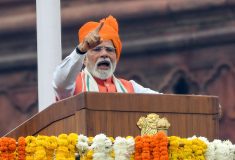Toronto | Reuters — A steady stream of Canadian visitors, particularly retirees headed to U.S. sun spots, crossed the U.S. border by car on Monday for the first time in 20 months as Washington lifted travel restrictions.
Traffic was heavy at times at some U.S. border posts such as Bluewater Bridge, Michigan near Sarnia, Ont., and Champlain, N.Y., about 70 km south of Montreal. But lines overall appeared to be moving steadily.
The U.S. imposed a travel ban in early 2020 in response to the coronavirus pandemic, barring access to most non-U.S. citizens traveling from 33 countries — including China, India and much of Europe — and restricting overland entry from Mexico and Canada.
Read Also

U.S. livestock: Feeder cattle hit contract highs on tight supply
Chicago | Reuters – All Chicago Mercantile Exchange feeder cattle futures and most live cattle futures hit contract highs on…
On Monday, packed intercontinental flights touched down, while the U.S. land borders with Mexico and Canada also saw families reunite.
“This whole half of my life has been missing for almost two years,” said Janet Simoni, who lives in London, Ont. and whose husband lives on the other side of the U.S.-Canada border near Detroit.
The two had missed major milestones including a graduation and funeral, she said.
The news of the border’s reopening unleashed “tremendous pent-up demand,” said Marty Firestone, whose travel insurance agency saw business up 25% last month compared to October 2019 — much of it from snowbirds.
Most travelers are required to show proof of vaccination in both directions. Some U.S. states also require a negative COVID-19 test. Canada requires a negative PCR test, which is more time-consuming and costly to get.
The PCR test requirement is deterring some short journeys, such as cross-border day-trippers looking for shopping deals, said Firestone. Canada’s chief public health officer Theresa Tam said on Friday the testing requirement was “actively being looked at.”
Meanwhile the Canada Border Services Agency is bracing for an influx of returning Canadian land travelers who may be unfamiliar with the rules, said Michael Prosia, an official in the agency’s southern Ontario region.
“There’s dueling obligations at play” between wanting to maintain public health requirements and facilitate border crossings, he said.
According to Statistics Canada, three-quarters of Canadian trips to the United States in 2019 were by car. That year Canadians made 21.5 million car trips across the border that involved less than a day’s stay.
Kristy Kennedy, an official at North Country Chamber of Commerce in northern New York, watched a live video feed of the border crossing at Champlain on Monday morning.
“Having seen it just so bare at the border for 20 months, I was curious… I wanted to log in and see if that relationship was as strong as it always has been,” she said. “And I think the two-hour wait and the two-mile-long lines of cars spoke volumes.”
The border reopening means a lot for her region, she said — just about every aspect of its economy is positively affected by the reopening. But now, she said, her organization is pushing for Canada’s PCR test requirement to be lifted.
“We’ve had a few people say, ‘Until that’s lifted, we really can’t come down to Plattsburg,” a city about 35 km south of Champlain.
Land or ferry travel to the U.S. from Canada for “essential” purposes remains exempt from the U.S. requirement for proof of vaccination, for now. “Essential” includes travel for “lawful trade, emergency response and public health purposes.”
The U.S. Department of Homeland Security has said it will require all inbound foreign travelers, whether for essential or non-essential reasons, to be vaccinated against COVID-19, starting on a not-yet-specified date in January 2022.
— Reporting for Reuters by Anna Mehler Paperny. Includes files from Glacier FarmMedia Network staff.
















